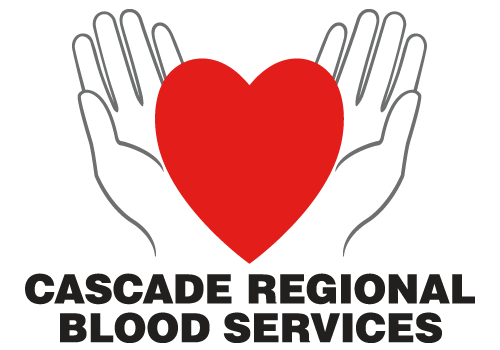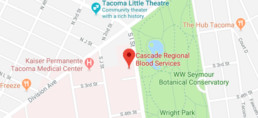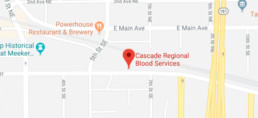Products
RED BLOOD CELLS and WHOLE BLOOD
Red blood cells are the most common type of blood cell and carry oxygen from the lungs to all body tissues. Red Blood Cell transfusions are routinely used for surgical and trauma patients. Other patients who benefit from red blood cell transfusion include those with anemia and those with blood disorders such as Sickle Cell Disease.
Whole blood is most often separated into blood components but is used for infants on rare occasions as well as surgical and life support devices.
PLASMA
Plasma is the liquid portion of the blood in which the red cells, white cells, and platelets are suspended. It consists mostly of water containing proteins, electrolytes and nutrients. Plasma transfusion is used to control bleeding during surgeries and trauma, and to treat patients with clotting disorders and major burns.
PLATELETS
Platelets are tiny cells circulating in the blood. Platelets gather at a bleeding site and clump together to form a plug that begins to seal the blood vessel. Platelets are often transfused to patients with bleeding disorders, and to those undergoing cancer treatments and organ transplants.
CRYOPRECIPITATE
Cryoprecipitate is a frozen blood product prepared from plasma. It is rich in clotting factors and commonly used to treat trauma victims and patients with bleeding disorders.
SPECIALIZED PRODUCTS
CRBS collects specialized blood products for use in research and patient care, such as autologous white blood cell products for manufacture dendreon.com. CRBS partners with MultiCare Health System to provide whole blood and platelets for pediatric heart surgeries though our Baby Blood Program. Special products are also collected for ECMO life support and LVAD placement surgeries. Over 170 such surgeries and procedures are conducted annually at MultiCare.
Services
THERAPEUTIC APHERESIS PROCEDURES
In addition to collecting blood to supply to our community hospitals, CRBS has a staff of highly-trained nurses who perform in-hospital procedures at MultiCare Tacoma General Hospital, MultiCare Good Samaritan Hospital, MultiCare Mary Bridge Children’s Hospital & Health Center, and Grays Harbor Community Hospital. The procedures include:
- Red Blood Cell Exchange – The removal and replacement of a patient’s diseased red blood cells with healthy cells.
- Cellular Depletions – The removal of harmful amounts of platelets or white blood cells from a patient’s blood.
- Therapeutic Plasma Exchange – The removal and replacement of a patient’s plasma, in order to remove pathogenic substances or replace deficiencies.
THERAPEUTIC PHLEBOTOMY
Therapeutic phlebotomy is a blood draw procedure prescribed by a physician or other licensed health care provider. It is a treatment to reduce accumulation of excess iron in the body, resulting from conditions such as hemochromatosis and polycythemia. Therapeutic phlebotomy is done by appointment only at our Tacoma, Puyallup, and Federal Way Donor Centers. All therapeutic treatments must Call 1-877-24-BLOOD to set an appointment.
All Therapeutic Phlebotomy requests require a completed “Request for Therapeutic Services” prescription.
Conditions Treated With Specialty Services
An increase in Red Blood Cells.
- RBCs carry oxygen to tissues
- Can be inherited or acquired
- Blood becomes thick/viscous
HEREDITARY/FAMILIAL
Due to an intrinsic defect of bone marrow stem cells.
SECONDARY/ACQUIRED
Body produces red cells due to a lack of oxygenation (hypoxemia). Happens in response to tissue hypoxia (smoking), chronic heart/lung diseases, tumors, sleep apnea, long term exposure to high altitude or use of androgenic steroids (testosterone therapy).
SIGNS & SYMPTOMS
Most due to increased blood viscosity. Headaches, dizziness, shortness of breath (SOB), nosebleeds, blurred vision, anorexia, weakness. If extreme, may lead to increased risk of stroke or heart attack.
A disorder that causes the body to absorb too much dietary iron.
- Also known as iron overload disorder
- Too much stored iron, if left untreated, can damage joints, organs (particularly skin, heart, liver and pancreas) and can be fatal.
HEREDITARY HEMOCHROMATOSIS (HHC)
TYPE 1: An inherited, genetic disorder is the most common type and appears in adulthood.
Type 2: A juvenile-onset disorder. Iron accumulation begins early in life and symptoms may appear in childhood.
Type 3: Intermediate between types 1 and 2. Onset usually begins before age 30.
Type 4: AKA Ferroportin disease which starts as an adult.
SIGNS & SYMPTOMS
Early symptoms: fatigue, joint pain, abdominal pain, and loss of sex drive.
Advanced symptoms: arthritis, liver disease, diabetes, heart abnormalities, and skin discoloration.
DEFERRAL
Permanent Deferral
healthline.com
ghr.nlm.nih.gov
hemoghromatosis.org
irondisorders.org
A disorder where the bone marrow makes too many red blood cells, white blood cells and platelets.
- Sometimes called erythrocytosis incorrectly as it is specific to an increase in red cells only.
PRIMARY POLYCYTHEMIA
Polycythemia Vera is a slow growing blood cancer in the bone marrow due to a genetic mutation. This mutation is generally not inherited.
SECONDARY POLYCYTHEMIA
Secondary polycythemia is a general term for the overproduction of red blood cells that occurs secondary to a known cause.
SIGNS & SYMPTOMS
Most due to increased blood viscosity. Itchy skin, headaches, blurred vision, fatigue, weakness, dizziness, excessive sweating, painful swelling of one joint (often big toe), shortness of breath, burning in hands and/or feet and feeling of fullness in abdomen due to an enlarged spleen.
DEFERRAL
Permanent Deferral



